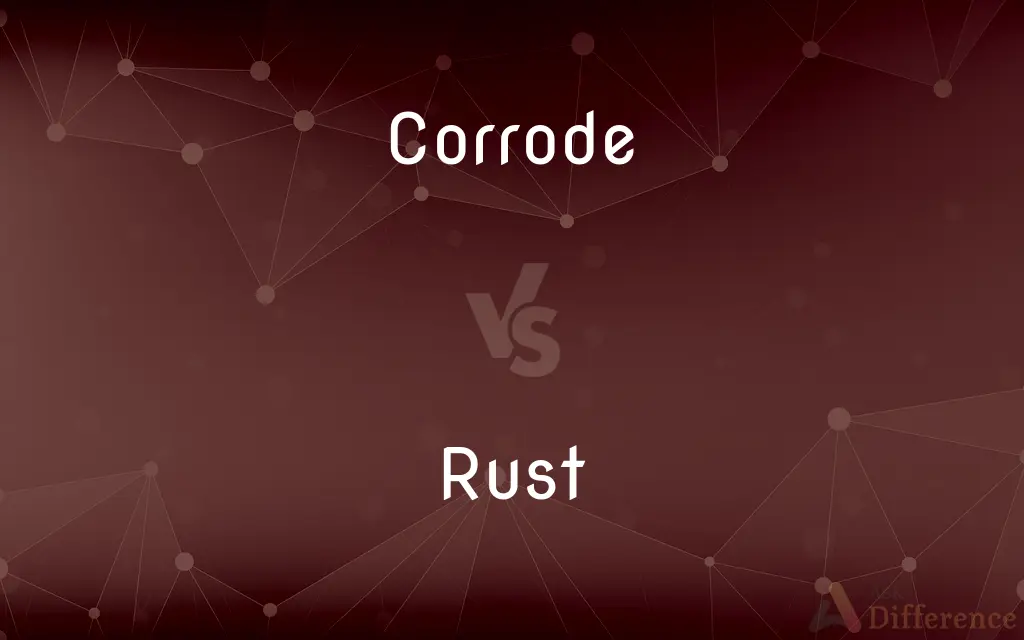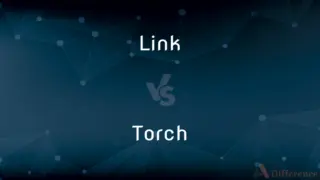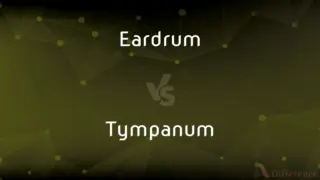Corrode vs. Rust — What's the Difference?
By Maham Liaqat & Fiza Rafique — Updated on March 28, 2024
Corrosion is a chemical process that deteriorates materials due to environmental reactions, while rust is a specific type of corrosion affecting iron and its alloys.

Difference Between Corrode and Rust
Table of Contents
ADVERTISEMENT
Key Differences
Corrosion is a broad term describing the chemical or electrochemical reaction between a material, usually metal, and its environment, leading to the material's deterioration. Rust, on the other hand, refers specifically to the red or orange coating that forms on the surface of iron and its alloys as a result of oxidation, particularly in the presence of moisture and oxygen.
While corrosion can affect a wide range of materials, including metals, ceramics, and polymers, and can be caused by various environmental factors, rust is exclusively associated with iron and steel. The presence of water and oxygen is essential for rusting to occur, whereas corrosion can occur under a broader set of conditions.
The process of corrosion can result in various outcomes depending on the material and the corrosive agents involved. Rust is a specific outcome of corrosion where iron oxidizes to form iron oxide, weakening the material and often resulting in a flaky and brittle surface.
Preventing corrosion can involve multiple strategies, including material selection, protective coatings, and environmental control. Rust prevention specifically focuses on shielding iron and steel from moisture and oxygen, often through paints, coatings, or galvanization.
The impact of corrosion is a critical consideration in many industries, leading to significant economic losses and safety hazards. Rust, while a common example of corrosion, highlights the particular vulnerabilities of iron-based materials to environmental degradation.
ADVERTISEMENT
Comparison Chart
Definition
The chemical or electrochemical process leading to the deterioration of a material due to environmental reactions.
A specific type of corrosion that occurs on iron and its alloys, resulting in a red or orange flaky coating.
Materials Affected
Metals, ceramics, polymers, etc.
Iron and steel
Causes
Various environmental factors such as moisture, oxygen, acids, salts.
Oxidation in the presence of moisture and oxygen.
Prevention Strategies
Material selection, protective coatings, environmental control.
Paints, coatings, galvanization to keep iron and steel dry.
Impact
Can lead to significant economic losses and safety hazards in various industries.
Weakens iron-based materials, leading to structural integrity issues.
Compare with Definitions
Corrode
Affects a wide variety of materials beyond metals.
Some ceramics can corrode under harsh chemical environments.
Rust
The formation of iron oxide as iron corrodes in the presence of oxygen and moisture.
The old car rusted after years of neglect.
Corrode
The deterioration of materials through a chemical or electrochemical process.
The pipes corroded after years of exposure to salty air.
Rust
Results in a distinctive red or orange flaky surface.
Rust on the bridge's surface indicates long-term exposure to moisture.
Corrode
A major concern across industries due to its impact on safety and costs.
The aircraft industry invests heavily in corrosion prevention techniques.
Rust
Prevented by keeping iron dry, using paints, or galvanization.
Painting iron fences is a simple way to prevent rust.
Corrode
Outcomes vary based on material and environment.
Aluminum corrodes but forms a protective oxide layer that prevents further damage.
Rust
Affects the structural integrity of iron-based structures.
Rusty beams need to be replaced to maintain building safety.
Corrode
Prevented through coatings, material choices, and environment control.
Stainless steel is used in marine environments to prevent corrosion.
Rust
Specifically affects iron and its alloys.
Galvanized steel is designed to resist rusting.
Corrode
To destroy (a metal or alloy) gradually, especially by oxidation or chemical action
The acid corroded the metal.
Rust
Rust is an iron oxide, a usually reddish-brown oxide formed by the reaction of iron and oxygen in the catalytic presence of water or air moisture. Rust consists of hydrous iron(III) oxides (Fe2O3·nH2O) and iron(III) oxide-hydroxide (FeO(OH), Fe(OH)3), and is typically associated with the corrosion of refined iron.
Corrode
To impair steadily; deteriorate
"Doubt and mistrust could creep into our lives, corroding personal and professional relationships" (Philip Taubman).
Rust
Any of various powdery or scaly reddish-brown or reddish-yellow hydrated ferric oxides and hydroxides formed on iron and iron-containing materials by low-temperature oxidation in the presence of water.
Corrode
To be eaten or worn away.
Rust
Any of various metallic coatings, especially oxides, formed by corrosion.
Corrode
(transitive) To eat away bit by bit; to wear away or diminish by gradually separating or destroying small particles of, as by action of a strong acid or a caustic alkali.
Rust
A stain or coating resembling iron rust.
Corrode
(transitive) To consume; to wear away; to prey upon; to impair.
My morale is being corroded day by day.
Rust
Deterioration, as of ability, resulting from inactivity or neglect.
Corrode
(intransitive) To have corrosive action; to be subject to corrosion.
Rust
Rust fungus.
Corrode
To eat away by degrees; to wear away or diminish by gradually separating or destroying small particles of, as by action of a strong acid or a caustic alkali.
Aqua fortis corroding copper . . . is wont to reduce it to a green-blue solution.
Rust
A plant disease caused by a rust fungus, characterized by reddish or brownish spots on leaves, stems, and other parts.
Corrode
To consume; to wear away; to prey upon; to impair.
Rust
A strong brown.
Corrode
To have corrosive action; to be subject to corrosion.
Rust
To become corroded.
Corrode
Cause to deteriorate due to the action of water, air, or an acid;
The acid corroded the metal
The steady dripping of water rusted the metal stopper in the sink
Rust
To deteriorate or degenerate through inactivity or neglect
My golf game has rusted from all those years of not playing.
Corrode
Become destroyed by water, air, or an etching chemical such as an acid;
The metal corroded
The pipes rusted
Rust
To become the color of rust.
Rust
(Botany) To develop a disease caused by a rust fungus.
Rust
To corrode or subject (a metal) to rust formation.
Rust
To impair or spoil, as by misuse or inactivity.
Rust
To color (something) a strong brown.
Rust
The deteriorated state of iron or steel as a result of moisture and oxidation.
The rust on my bicycle chain made cycling to work very dangerous.
Rust
A similar substance based on another metal (usually with qualification, such as "copper rust").
Aerugo. Green or blue-green copper rust; verdigris. (American Heritage Dictionary, 1973)
Rust
A reddish-brown color.
Rust
A disease of plants caused by a reddish-brown fungus.
Rust
(philately) Damage caused to stamps and album pages by a fungal infection.
Rust
(intransitive) To oxidize, especially of iron or steel.
The patio furniture had rusted in the wind-driven spray.
Rust
(transitive) To cause to oxidize.
The wind-driven spray had thoroughly rusted the patio furniture.
Rust
(intransitive) To be affected with the parasitic fungus called rust.
Rust
To (cause to) degenerate in idleness; to make or become dull or impaired by inaction.
Rust
(intransitive) Of a black cat or its fur, to turn rust-coloured following long periods of exposure to sunlight.
It's very common for black cats to rust during the summer.
Rust
The reddish yellow coating formed on iron when exposed to moist air, consisting of ferric oxide or hydroxide; hence, by extension, any metallic film of corrosion.
Rust
A minute mold or fungus forming reddish or rusty spots on the leaves and stems of cereal and other grasses (Trichobasis Rubigo-vera), now usually believed to be a form or condition of the corn mildew (Puccinia graminis). As rust, it has solitary reddish spores; as corn mildew, the spores are double and blackish.
Rust
That which resembles rust in appearance or effects.
Sacred truths cleared from all rust and dross of human mixtures.
Rust
To contract rust; to be or become oxidized.
If gold ruste, what shall iron do?
Our armors now may rust.
Rust
To be affected with the parasitic fungus called rust; also, to acquire a rusty appearance, as plants.
Rust
To degenerate in idleness; to become dull or impaired by inaction.
Must I rust in Egypt? never moreAppear in arms, and be the chief of Greece?
Rust
To cause to contract rust; to corrode with rust; to affect with rust of any kind.
Keep up your bright swords, for the dew will rust them.
Rust
To impair by time and inactivity.
Rust
A red or brown oxide coating on iron or steel caused by the action of oxygen and moisture
Rust
A reddish-brown discoloration of leaves and stems caused by a rust fungus
Rust
The formation of reddish-brown ferric oxides on iron by low-temperature oxidation in the presence of water
Rust
Any of various fungi causing rust disease in plants
Rust
Become destroyed by water, air, or an etching chemical such as an acid;
The metal corroded
The pipes rusted
Rust
Cause to deteriorate due to the action of water, air, or an acid;
The acid corroded the metal
The steady dripping of water rusted the metal stopper in the sink
Rust
Become coated with oxide
Rust
Of the color of rust
Common Curiosities
Can materials other than metals corrode?
Yes, materials such as ceramics and polymers can also undergo corrosion under certain conditions.
What is rust?
Rust is a specific type of corrosion that results in the formation of a red or orange flaky coating on iron and its alloys.
Are corrosion and rust the same?
Rust is a type of corrosion specifically affecting iron and steel, whereas corrosion can affect a wide range of materials.
Why does iron rust?
Iron rusts due to the oxidation process when it comes into contact with oxygen and moisture, forming iron oxide.
What causes corrosion?
Corrosion is caused by environmental factors such as moisture, oxygen, acids, and salts reacting with the material.
Is rust harmful?
Rust can weaken iron-based materials, affecting their structural integrity and potentially leading to safety hazards.
What does corrode mean?
Corrode refers to the process by which materials deteriorate due to chemical or electrochemical reactions with their environment.
Does all corrosion result in visible damage?
Not all corrosion results in visible damage initially, but most types of corrosion will eventually lead to material degradation that can be seen or measured.
How does the environment affect corrosion?
The environment plays a significant role in corrosion, with factors like humidity, temperature, and the presence of corrosive substances accelerating the process.
Can stainless steel rust?
Stainless steel is more resistant to rust due to the presence of chromium, which forms a protective layer, but it can rust under certain conditions.
How can corrosion be prevented?
Corrosion can be prevented through various methods, including the use of protective coatings, material selection, and controlling the environment.
Why is rust prevention important in construction?
Rust prevention is crucial in construction to ensure the longevity and safety of iron-based structures.
What is galvanization?
Galvanization is a process of applying a protective zinc coating to steel or iron to prevent rusting.
What are common methods to prevent rust?
Common methods include applying paint or coatings, using rust-resistant materials like stainless steel, and galvanization.
Can corroded materials be repaired?
Some corroded materials can be repaired or restored, depending on the extent of the damage and the type of material.
Share Your Discovery

Previous Comparison
Link vs. Torch
Next Comparison
Eardrum vs. TympanumAuthor Spotlight
Written by
Maham LiaqatCo-written by
Fiza RafiqueFiza Rafique is a skilled content writer at AskDifference.com, where she meticulously refines and enhances written pieces. Drawing from her vast editorial expertise, Fiza ensures clarity, accuracy, and precision in every article. Passionate about language, she continually seeks to elevate the quality of content for readers worldwide.














































